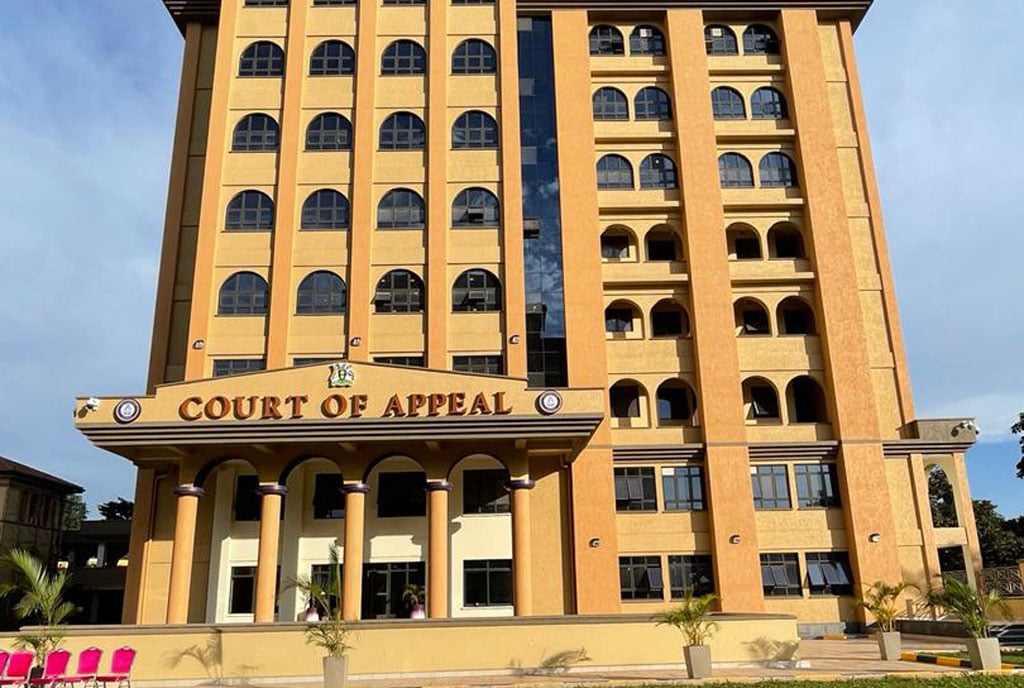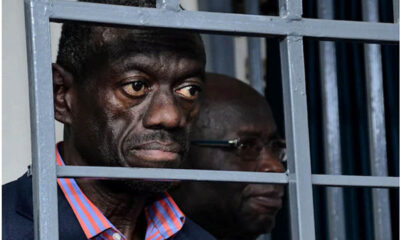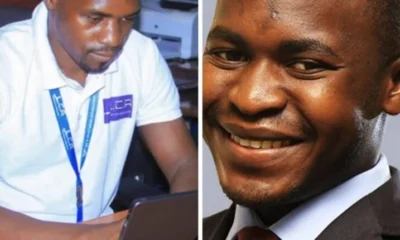
Court Quashes Petition Blocking Shs 1.4tn Lubowa Hospital Loan
The Constitutional Court has dismissed a petition seeking to stop parliament from guaranteeing Shs 1.4 trillion to an Italian investor for the construction of the International Specialized Hospital of Uganda (ISHU) in Lubowa.
In a unanimous decision, Constitutional court justices comprising Fredrick Egonda-Ntende, Catherine Bamugemereire, Irene Mulyagonja, Monica Mugenyi, and Oscar Kihika dismissed the petition filed by civil society organisation, Initiative for Social Economic Rights (ISER) against the Attorney General on grounds that parliament passed a resolution after the ministry of Health and Ministry of Finance entered into the direct agreement for the financing of the loan in issue, and therefore, did not come into operation until the resolution was passed, as is required by Article 159 (5) of the Constitution.
In February 2013, FINASI proposed President Yoweri Museveni build and manage specialized healthcare facilities at Entebbe Grade A Hospital and the Uganda Cancer Institute. As a result, the president directed the ministries of Health and Finance to negotiate the project and its financing.
Consequently, on January 27, 2016, the government entered into a project services agreement with ISHU to undertake the operations and management of the facilities of the hospital for eight years.
The Ministry of Health and Ministry of Finance on behalf of the government then entered into a project works investment agreement with Finasi/Roko Construction Special Purpose Vehicle Limited (Finasi/Roko).
This resulted in the two ministries entering into a lender’s direct agreement with the African Export-Import Bank and others, to facilitate the construction of the hospital. In line with the said agreements, records before the court indicate that when Finasi/Roko presented the first milestone completion certificate, duly certified and the ministry of Finance was required to issue a promissory note within two weeks, which was due by December 22, 2018.
However, the government defaulted and was therefore liable to pay a penalty. Records further indicate that on February 12, 2019, the minister of state for Finance in charge of planning tabled a proposal before parliament for government to issue promissory notes, not exceeding $379.71 million (then Shs 1.4 trillion) to Finasi/Roko for financing the design, construction and equipping of the hospital.
Consequently, in March 2019, the parliamentary committee on national economy to which the proposal was referred by parliament for consideration, observed that the necessary approval had not been granted by parliament but it went ahead to recommend that parliament approves the issue of the promissory notes.
According to the evidence before court, a minority report was issued by some members of the committee in which they opposed the recommendation but promissory notes were issued. Dissatisfied with all these actions, ISER filed a constitutional petition against the Attorney General, saying that the actions of the government were unconstitutional because the entire procedures leading to approval were improper.
ISER argued that the process of the conceptualization of the project was marred with a lack of transparency and participation of the citizens who are bound to shoulder the financial implication of the loan obligations, which the state has illegally gotten into.
They further argued that the construction of the hospital at Lubowa will not solve Uganda’s health sector challenges and that as such a project runs against the broader national interests that should be protected. ISER asked court to cancel the agreement and to order that within one year from the determination of the petition, parliament furnishes the court with a comprehensive framework on how it intends to ensure effective citizen participation in the processes leading to approval of the project.
They also asked court to order Finance and Health ministers to ensure that all necessary steps are taken to implement the project in line with the Public-Private Partnership Act. On his part, the Attorney General asked court to dismiss the petition on grounds that whereas the petitioner pleaded that the impugned act contravenes the Constitution, the petition did not disclose any dispute that requires the interpretation of the Constitution; instead, the petitioner seeks the application of the articles of the Constitution cited.
The Attorney General further submitted that the petitioner could have sought and obtained redress in an action for judicial review in the High court, by challenging the actions of entering into the ISHU agreements as illegal and having them quashed.
Government further submitted that while it was contended in the answer that the promissory notes that were issued did not amount to a guarantee of any loan payment obligation, after the filing of the pleadings and evidence, it was established that the Attorney General, in December 2018, issued legal advice to the ministry of Finance that the promissory notes which were provided for in the direct agreement constituted a guarantee to the lenders in support of the Fiansi/Roko Construction SPV.
He accordingly conceded that because the promissory notes were under the direct agreement between the government and Finasi/Roko Construction SPV; African Export-lmport Bank and Barclays Bank of Uganda (“the lenders”), by which the government was to make guarantees to both the SPV and the lenders, the promissory notes constituted a guarantee to both the SPV and the lenders for the contemplated loans in support of the SPV.
Regarding other submissions, the government indicated that they didn’t require interpretation by the Constitutional court. In their judgement, the Constitutional court justices have ruled that the loan that is challenged was, in their view obtained under the second limb of clause (3) of section 36 PFMA (Public Finance Management Act).
“My understanding of the requirement in section 36 (5) then is that it does not require approval of the terms of the loan to be laid before parliament before the instrument under which the loan is obtained is executed. What is required is that the terms must be laid before parliament and approved before the loan is enforced,” said Mulyagonja who wrote the lead judgement.
They said the direct agreement was dated December 4, 2018, which placed it in the financial year 2018/2019. While relying on the affidavit of Charles Byaruhanga, court stated that the first milestone completion certificate was issued by the owner’s engineer on December 20, 2018.
But the promissory notes were not issued until April 2019, within the same financial year. However, according to the justices, by that date, parliament had passed the resolution on March 12, 2019, approving the proposal by Finance for the government to issue promissory notes worth $379.71 million to the contractor.
They noted that this is in relation to section 23 (2) which gives parliament power to authorize a vote to make a multi-year expenditure commitment, which should then be indicated in the annual budget.
“In conclusion, the provisions Article 159 (2)’, (5), and (6) of the Constitution were satisfied by sections 23 and 36 of the PFMA. The direct agreement was laid before parliament, which scrutinized it through the committee on national economy, and the requisite resolution was passed by parliament,” held the justices.
This decision marks a significant outcome in the ongoing debate surrounding public-private partnerships and healthcare infrastructure development in Uganda.
Court Quashes Petition Blocking Shs 1.4tn Lubowa Hospital Loan
News
Ugandan Citizen Abducted, Held in Secret Detention for Three Months, Sparks Outrage and Calls for Justice

A disturbing new case of unlawful detention has surfaced, highlighting the ongoing human rights crisis in Uganda. A Ugandan citizen was reportedly abducted and held in a secret facility, known as a “safe house,” for three months, only to be released without charge or explanation. This incident, reported by NTV Uganda, has sparked widespread condemnation and renewed calls for accountability regarding human rights abuses in the country.
While the details surrounding the abduction remain unclear, reports indicate that the individual was taken without due process and held incommunicado—an action that has long been condemned by human rights organizations. The victim’s release, with no charges filed and no clear justification, has angered activists and citizens, who view this as yet another case of egregious abuse of power by the state.
“This is a recurring pattern,” said one human rights activist. “Abductions, secret detentions, and unexplained releases have become all too common in Uganda. These acts violate fundamental human rights and erode public trust in the justice system.”
The use of “safe houses,” unregistered detention facilities reportedly operated by security forces, has been a focal point in numerous allegations of torture and illegal imprisonment. Despite repeated calls from both local and international organizations for their closure and accountability for those involved, little action has been taken to address these violations.
This case underscores the urgent need for reform within Uganda’s security apparatus and greater accountability for human rights abuses. Observers hope that drawing attention to these injustices will spur concrete action to bring those responsible to justice and ensure the protection of basic human rights.
As frustration mounts, calls for both domestic and international pressure to hold the government accountable for such crimes grow louder. “One day, there must be accountability for all these crimes against our people,” stated one social media user, reflecting the sentiments of many Ugandans.
News
NUP Gathering Disrupted: Kyagulanyi Alleges Security Force Harassment and Arrests

National Unity Platform (NUP) President Robert Kyagulanyi has accused Ugandan security forces of using excessive force to disrupt a planned NUP gathering. The allegations were detailed in a statement shared on Twitter, following an event held to honor children of NUP supporters who were killed, disappeared, or detained for their political beliefs.
According to Kyagulanyi, security personnel, under the command of an officer identified as Asiimwe, carried out a preemptive operation early in the morning upon learning of the NUP’s plans. The forces allegedly stormed the premises, arrested workers, and deployed tear gas to disperse those present.
“The criminals under the command of one Asiimwe deployed early morning, arrested our workers, and threw tear gas into our premises. They’ve cordoned off the premises and blocked all people from accessing the place,” Kyagulanyi wrote.
Among those reportedly arrested were Saava Peter, Mudenya Samson, and Turyasingura Samson. Kyagulanyi claimed the detained workers were subjected to beatings and interrogated about their political affiliations, with security operatives labeling them as terrorists.
“These JATT operatives asked the workers who they support politically, branding them terrorists and criminals—their only crime being that they work with us. You can imagine the indignity!” Kyagulanyi lamented.
This incident adds to the growing tension in Uganda’s political climate, where opposition parties frequently accuse the government of stifling dissent. Despite the challenges, Kyagulanyi ended his statement with a message of defiance and optimism, proclaiming, “UGANDA WILL BE FREE.”
NUP Gathering Disrupted: Kyagulanyi Alleges Security Force Harassment and Arrests
News
Sudan Demands Apology from Uganda Over Army Chief Muhoozi Kainerugaba’s Threat to Invade Khartoum

Sudan has demanded an official apology from Uganda over “offensive and dangerous” comments made by the chief of Uganda army staff, who threated to invade Khartoum, the Sudan Tribune has reported.
General Muhoozi Kainerugaba, son of Ugandan President Yoweri Museveni and CDF of the Ugandan army, posted two comments on the X platform on Tuesday in which he threatened “to capture Khartoum” with the support of the US President elect Donald Trump after he takes office. The posts were deleted later.
“The government of Sudan demands and official apology from the Ugandan government for the offensive and dangerous comments of the army commander,” Sudan’s foreign ministry said in a statement that the Sudan Tribune said it has seen.
Sudan Demands Apology from Uganda Over Army Chief Muhoozi Kainerugaba’s Threat to Invade Khartoum









